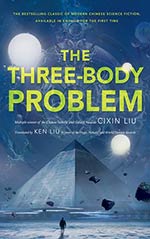
![]() Rabindranauth@DDR
Rabindranauth@DDR
12/7/2014
![]()
Hard science fiction with a haunting, cynical tone that tips it's hat at commercial success. The Three Body Problem was a powerful introduction in what's shaping up to be a new favorite series. It's been touted a 'multiple-award winning phenomenon' in China, and you know what? It's praise well deserved.
Following the events of China's Cultural Revolution, a classified military project manages to send out the first signal into space powerful enough to have the highest probability of being detected by an extraterrestrial presence. A signal that was received. Now, Earth finds itself the solution to a desperate people. A people who are coming. Meanwhile on Earth, the confirmed existence of others out there has created many factions, all with plans to either aid the invasion, fight it or simply survive it. Needless to say, things get very hairy very fast.
I really enjoyed this. It's first time in English print after being a major hit in China, there was no way I was going to let this cross my reading list and not check it out. The sheer logistics of becoming a hit, within SF circles, in a nation with over 1 billion people gave me all the confirmation I needed that this was going to be a great read. And it was.
The writing was the most interesting part. My biggest concern with this was that what made it such a hit would be lost, or at least diluted in translation, but Ken Liu does a wonderful job; this book packs a punch. A cynical, hopeless punch with just enough sunshine in there to prove that in it's darkest moments, humanity is first and foremost indomitable. Even if said reaction is little more than a token resistance. Hard science fiction that does a wonderful job of delving into and exploring complex problems, it was hard not to devour it in large sittings. The mark of an excellent hard novel for me is one that manages to not only present its concepts in vivid, imaginative ways that capture my mind, but manage to do so without completely losing me. There's nothing more satisfying than that moment of understanding, when the science clicks and you just have to love the sheer immensity, the possibility that technology holds. Cixin Liu wonderfully plays on that feeling for me, and effectively guaranteed that this book would be a hit for me.
The imagination. The imagination absolutely steals the show. Trisolaris is a world that is the embodiment of the three-body problem, and the ramifications this has on the inhabitants is absolutely breathtaking to consider. Presented as a game the inhabitants of Earth delve into [that hat tip I mentioned], the world of Trisolaris is easily the most visually engaging part of the book, and a section that has extreme ramifications on the story as a whole. However, the imagination isn't limited to only this section of the story; the plot itself gets a fair treatment of it. As the story begins, Liu slowly lays out a situation that never seems to make sense... . . and then he hits you with the truth. What feels like a basic storyline suddenly takes on a feeling of three-dimensionality as it instantly becomes clear how heavily every seemingly-separate part of the plot is tied into the other. And considering this is a tale that flashes back a few decades in instances, it's an understatement to say the punches just never stop coming.
But what separates this from your average flashy science fiction novel with rockets and guns and soldiers soldierin'? Depth. This entire tale, as much as it seems to fit genre standards, feels like what it first and foremost is, an exploration. An exploration of humanity, and a critique. Most novels that do this make you feel like humanity isn't worth your spit if it were on fire, but Liu takes a more subtle approach. Interspersed into it are the random acts of kindness, of humanity that make you rethink, and make you hope, that maybe, just maybe, everything isn't so dark, so bleak, so hopeless. In short? The entire situation is that lovely shade that holds the most potential in a tale when you throw characters into volatile situations; grey. Anything can happen, and at times, anything does happen.
Pretty much my only complaint with it is that I never quite found myself engaged with any of the characters. However, that's not much of a complaint; based on the time scale for events presented in here, the characters are more than likely minor elements to the tale. And even if this assumption isn't true, the bulk of the time was spent delving into the science, developing the state of events into what it currently is, and exploring the world of Trisolaris; the fraction of it we've seen so far at least. The characters generally become side material in this case also.
All in all, a truly spectacular novel that I absolutely chugged, how hard to put down it was. Very hard science fiction, it probably isn't going to work for readers who don't like technical stuff, and that may be the only reason it doesn't storm the SFF awards next year the way Ancillary Justice did. Nevertheless, whatever it's reception on that front, The Three-Body Problem is a book I think no science fiction fan should miss. None whatsoever.
ARC provided via NetGalley in exchange for an honest review.
http://drunkendragonreviews.wordpress.com/